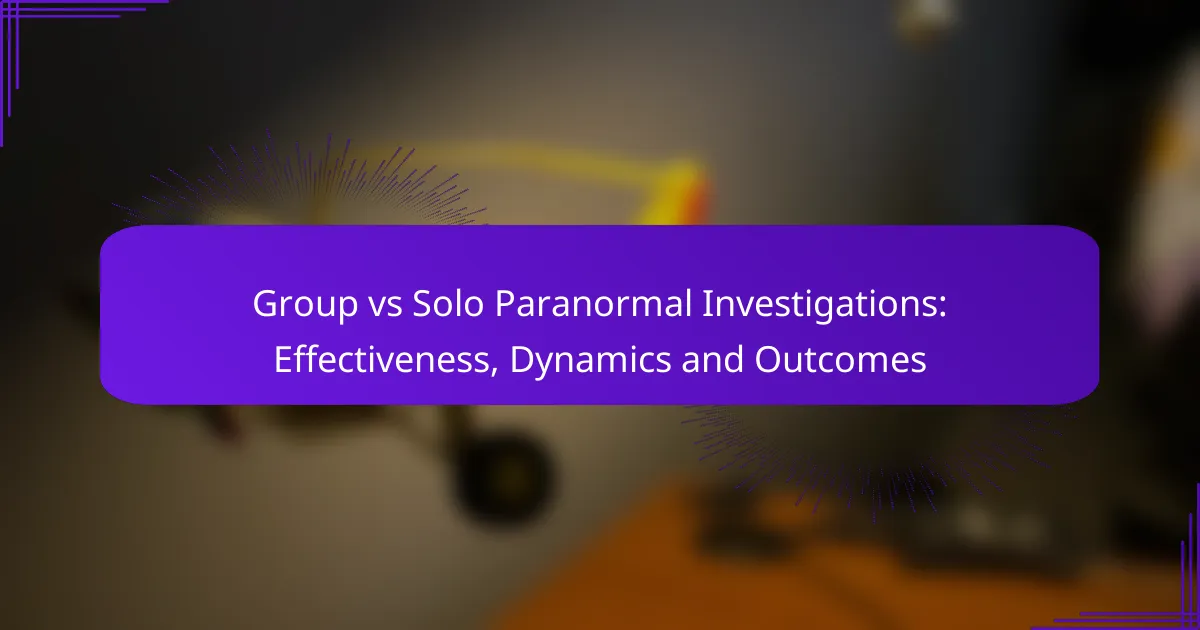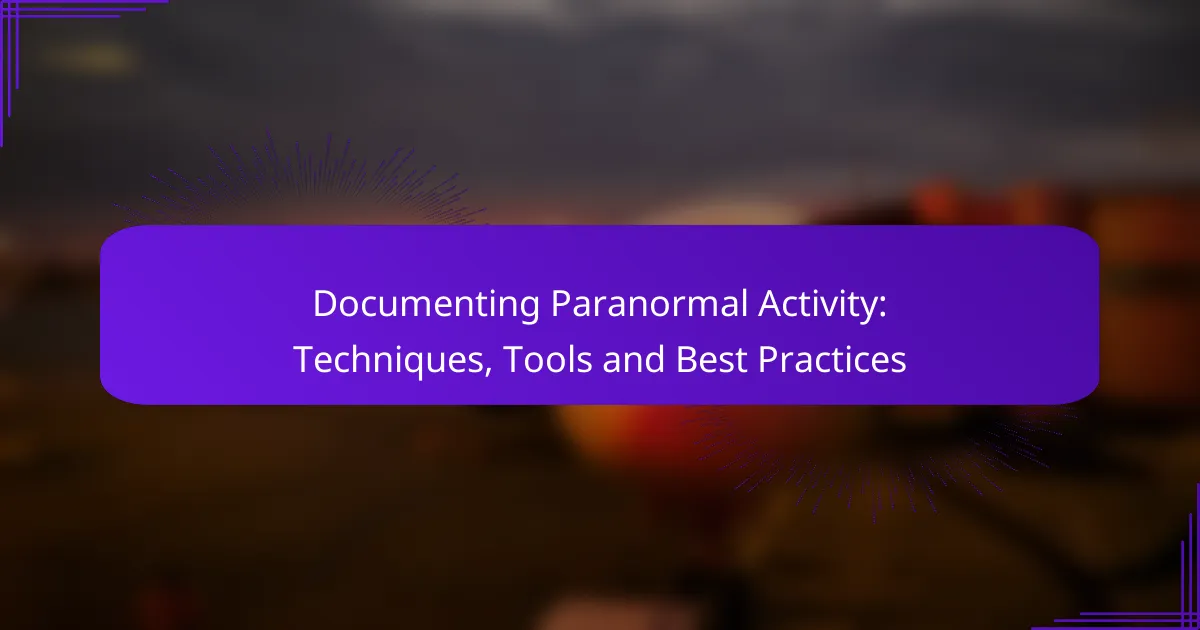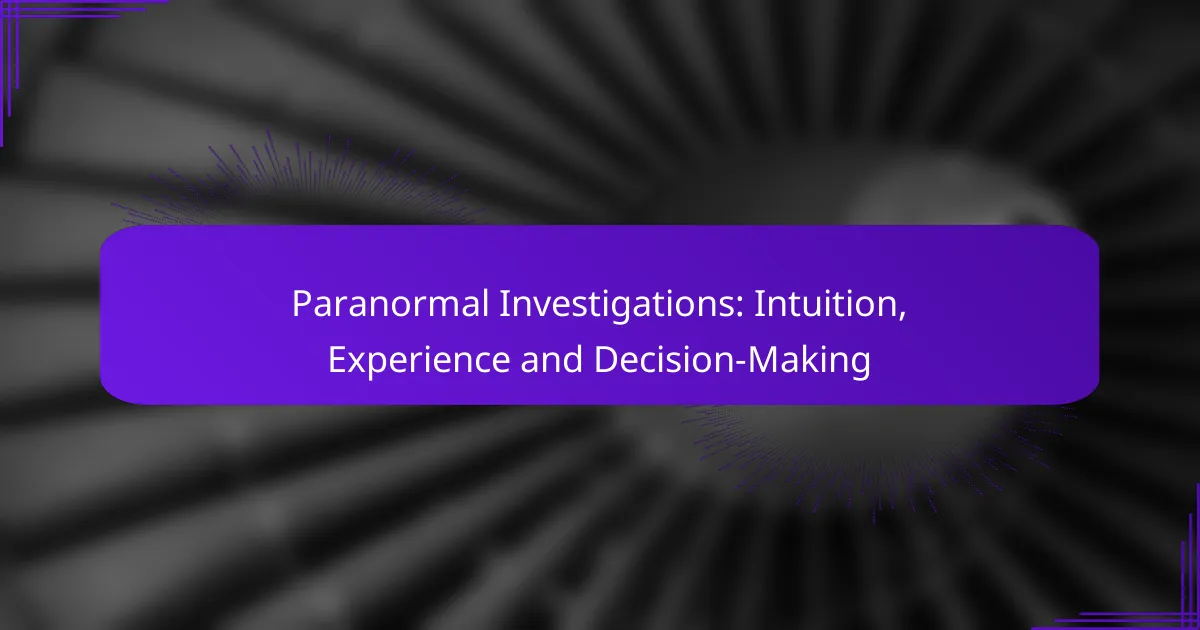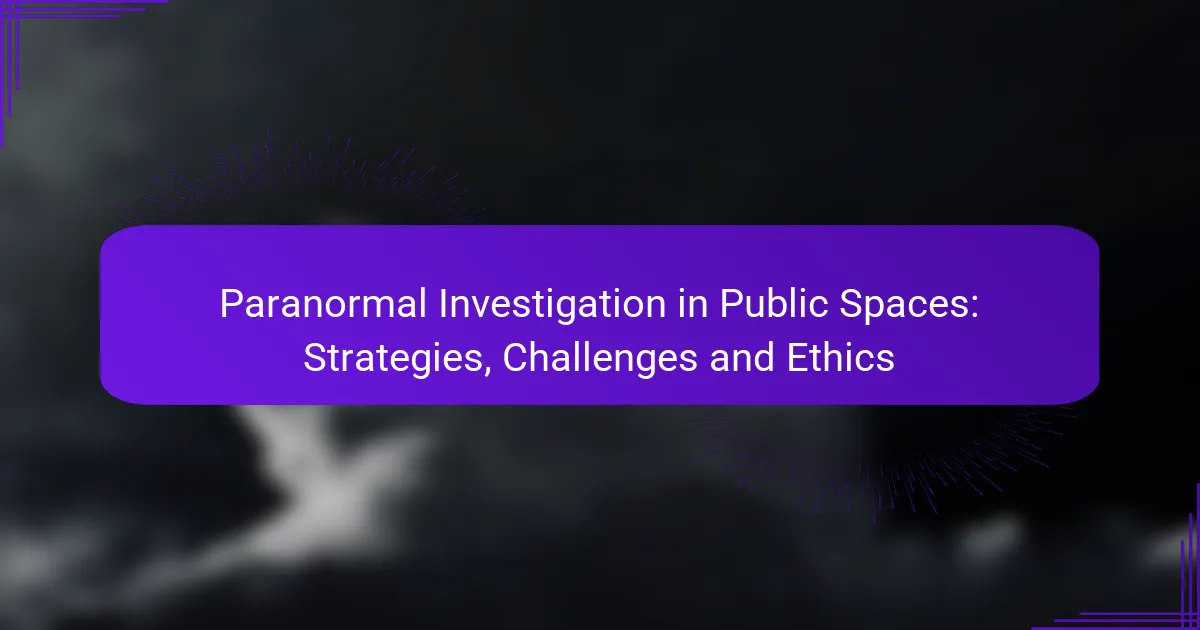Group and solo paranormal investigations present distinct approaches that influence their effectiveness, dynamics, and outcomes. While group investigations leverage multiple perspectives and collaborative resources, solo investigations foster a more personal connection to the paranormal experience. Understanding these differences is crucial for investigators aiming to maximize their findings and enhance their overall experience.
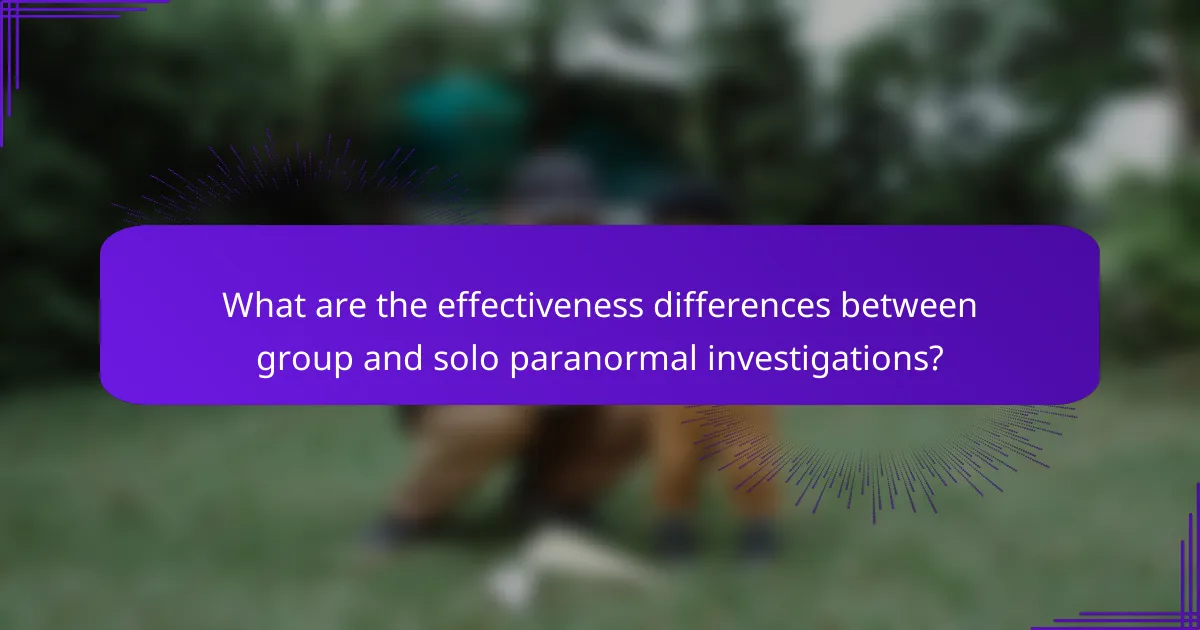
What are the effectiveness differences between group and solo paranormal investigations?
Group and solo paranormal investigations differ significantly in effectiveness, dynamics, and outcomes. Group investigations benefit from multiple viewpoints and shared resources, while solo investigations offer a more intimate and personal connection to the experience.
Group investigations offer diverse perspectives
In group paranormal investigations, participants bring varied backgrounds, beliefs, and techniques, which can lead to a richer exploration of phenomena. This diversity allows for a broader range of interpretations and insights, enhancing the overall experience. For example, one investigator may notice an unusual sound while another might capture a compelling visual anomaly.
Additionally, having multiple people can facilitate discussions that help to analyze findings in real-time. This collaborative approach can lead to more thorough documentation and a better understanding of the events occurring during the investigation.
Solo investigations allow for deeper personal experiences
Solo paranormal investigations provide an opportunity for individuals to connect deeply with their surroundings without the influence of others. This personal engagement can lead to unique insights and emotional responses that may not surface in a group setting. Investigators often report feeling more attuned to their environment when alone.
Moreover, solo investigations allow for a flexible schedule and the ability to explore locations at one’s own pace. This autonomy can foster a sense of freedom, enabling investigators to follow their instincts and delve into areas of interest without distraction.
Group dynamics can enhance evidence collection
Group dynamics in paranormal investigations can significantly improve evidence collection. With multiple investigators present, there is a greater chance of capturing various types of evidence, such as audio recordings, photographs, and video footage. Each member can operate different equipment simultaneously, increasing the likelihood of documenting paranormal activity.
Moreover, group members can quickly share observations and reactions, which can lead to immediate follow-up actions, such as revisiting a specific area or adjusting equipment settings. This collaborative effort can create a more comprehensive record of the investigation.
Solo investigations may lead to heightened sensitivity
During solo investigations, individuals often experience heightened sensitivity to their surroundings, which can lead to more profound encounters. Without the distraction of others, investigators may become more aware of subtle changes in the environment, such as temperature fluctuations or unexplained sounds.
However, this increased sensitivity can also make solo investigators more susceptible to fear or anxiety. It is essential for those conducting solo investigations to remain grounded and use techniques such as mindfulness to manage their emotional state effectively. This balance can enhance the overall experience and lead to more meaningful findings.
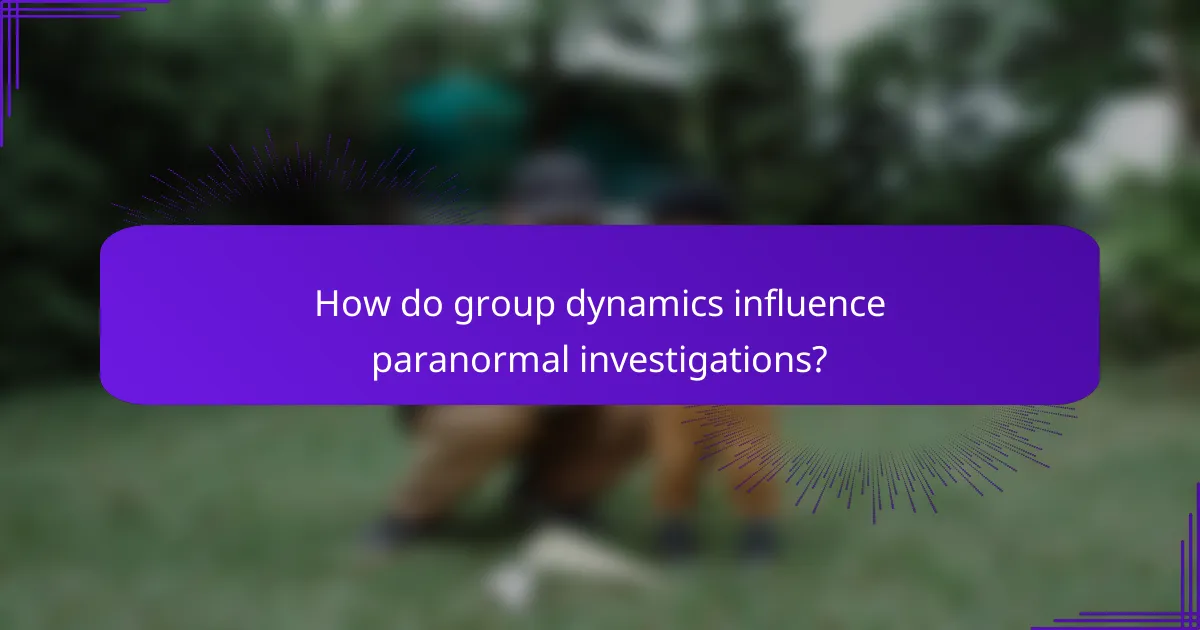
How do group dynamics influence paranormal investigations?
Group dynamics significantly affect the effectiveness of paranormal investigations by shaping how team members interact, share information, and make decisions. A well-functioning team can enhance the overall investigation experience, while poor dynamics may lead to misunderstandings and missed opportunities for evidence collection.
Team collaboration improves data analysis
Collaboration within a team allows for diverse perspectives, which can lead to more thorough data analysis during paranormal investigations. When team members share their findings and insights, they can identify patterns or anomalies that an individual might overlook. For example, one investigator might notice a spike in electromagnetic fields, while another might correlate it with a specific event or location.
Utilizing tools like shared digital platforms for data entry and analysis can streamline this process. Teams should consider regular debriefings to discuss findings and refine their approaches, ensuring that all members are on the same page and contributing effectively.
Conflict resolution impacts investigation outcomes
Effective conflict resolution is crucial for maintaining a productive atmosphere during paranormal investigations. Disagreements can arise over interpretations of evidence or the direction of the investigation, which can hinder progress if not addressed promptly. Teams should establish clear communication protocols to handle conflicts constructively, allowing for open dialogue and mutual respect.
Implementing strategies such as active listening and seeking consensus can help mitigate tensions. For instance, if a team member disagrees with the validity of certain evidence, facilitating a discussion where each viewpoint is considered can lead to a more comprehensive understanding and better decision-making.
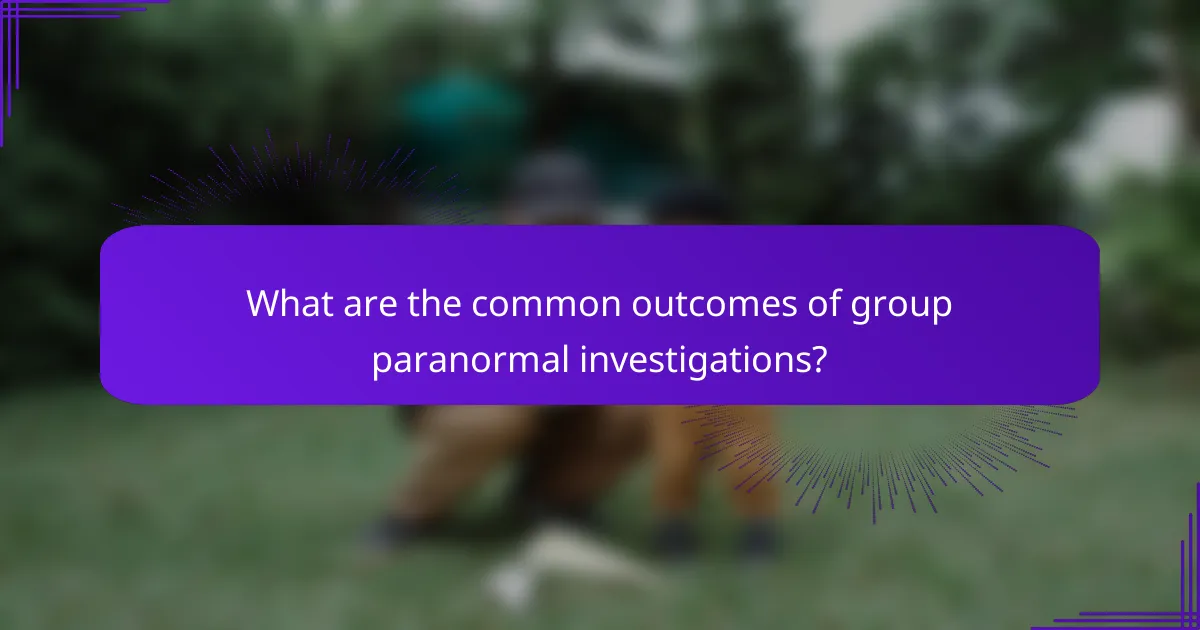
What are the common outcomes of group paranormal investigations?
Group paranormal investigations often lead to enhanced evidence validation and a sense of community among participants. These outcomes arise from the collaborative nature of group work, which allows for diverse perspectives and shared experiences.
Increased evidence validation
When multiple investigators are present, the likelihood of validating paranormal evidence increases. This is due to the ability to cross-reference findings, such as audio recordings or visual anomalies, which can help confirm or refute claims of paranormal activity.
For instance, if one investigator captures a strange sound, others can corroborate it by reviewing their own recordings. This collective analysis can lead to a more robust understanding of the phenomena being studied.
Shared experiences foster community
Group investigations create opportunities for participants to bond over shared experiences, which can enhance their interest in paranormal research. Engaging with like-minded individuals fosters a sense of belonging and encourages ongoing participation in the field.
Moreover, these shared experiences can lead to the formation of lasting friendships and networks, which are beneficial for future investigations. Participants often exchange tips and insights, enriching their collective knowledge and skills in paranormal exploration.
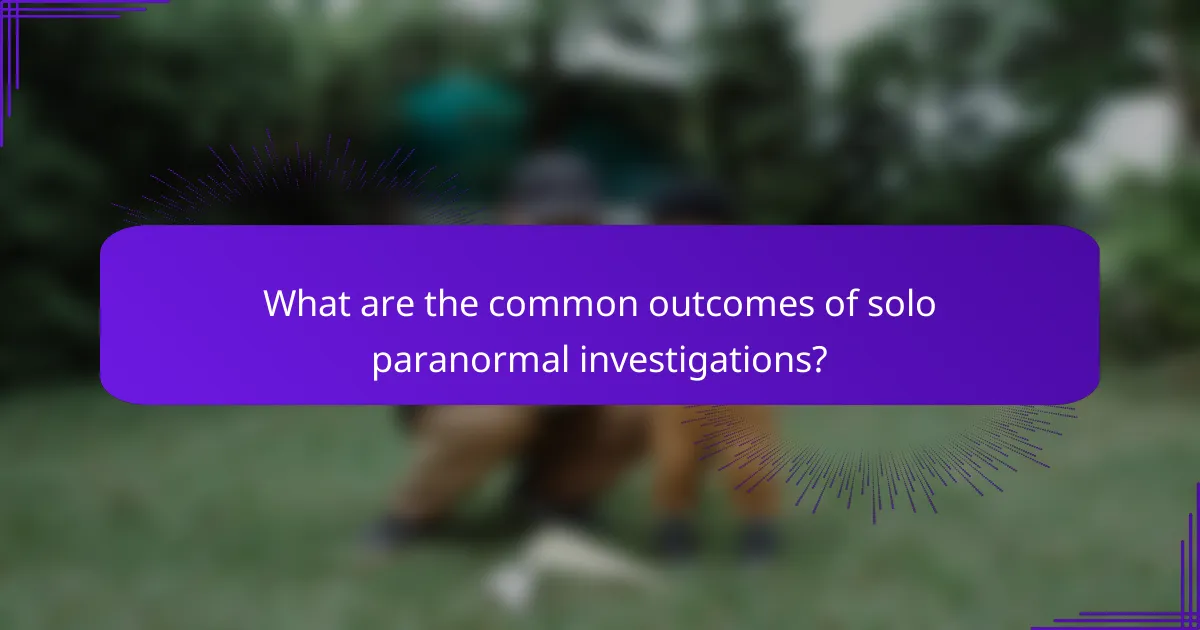
What are the common outcomes of solo paranormal investigations?
Solo paranormal investigations often yield unique personal experiences and insights, as individuals navigate the unknown independently. However, they can also present emotional challenges that may affect the investigator’s mental well-being and decision-making.
Unique personal insights
Conducting investigations alone allows for deep personal reflection and a unique connection to the environment. Investigators may uncover insights that resonate with their personal beliefs or experiences, leading to a more profound understanding of the paranormal phenomena they encounter.
For instance, a solo investigator might notice subtle changes in their surroundings or develop a heightened sensitivity to energy shifts, which could be overlooked in a group setting. This individual focus can lead to discoveries that are deeply personal and transformative.
Potential for emotional challenges
While solo investigations can be rewarding, they also pose emotional risks. Being alone in potentially unsettling environments may lead to feelings of fear, anxiety, or isolation, which can cloud judgment and impact the overall experience.
It’s crucial for solo investigators to prepare mentally and emotionally before embarking on their journey. Setting clear intentions, practicing grounding techniques, and having a safety plan can help mitigate these challenges. Regular self-reflection after investigations can also aid in processing any emotional responses that arise.
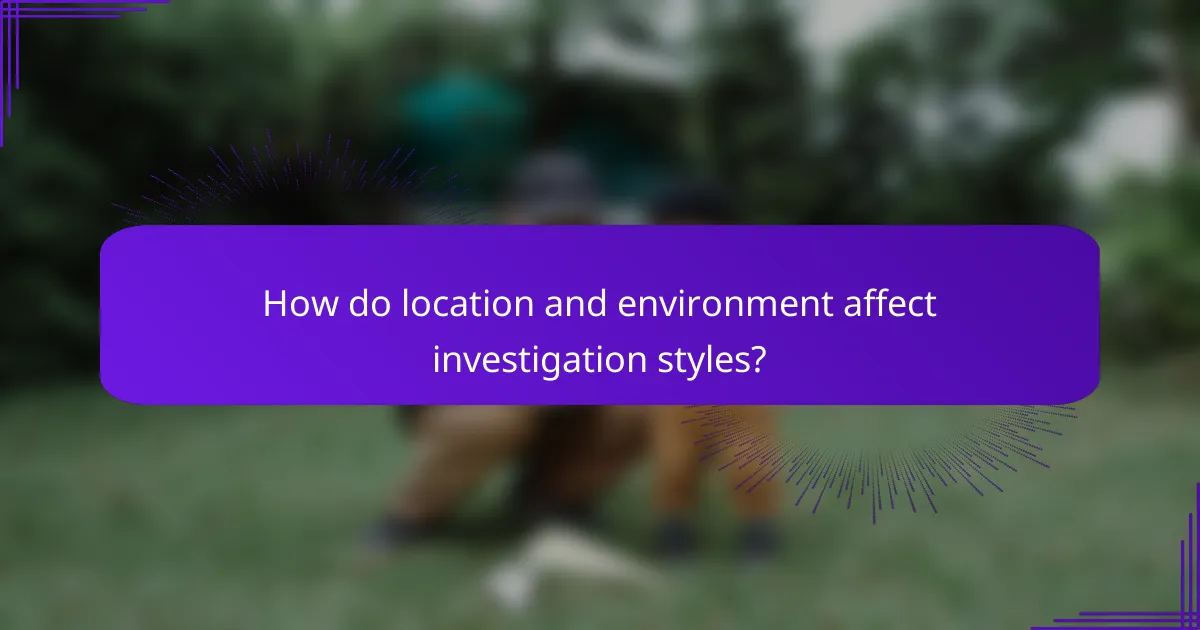
How do location and environment affect investigation styles?
Location and environment significantly influence the effectiveness of paranormal investigations, shaping whether group or solo approaches are more suitable. Urban areas often provide unique challenges and opportunities that favor teamwork, while rural settings can enhance the benefits of individual exploration.
Urban locations favor group investigations
In urban environments, the presence of multiple investigators can enhance safety and increase the chances of capturing evidence. Groups can cover more ground, share insights in real-time, and provide emotional support, which is crucial in potentially unsettling settings.
Additionally, urban locations may have a higher density of reported paranormal activity, making it beneficial to have various perspectives and skills. For instance, a team can include tech specialists for equipment setup, skeptics to analyze findings, and sensitive individuals to gauge the atmosphere.
Rural settings may benefit solo approaches
Rural areas often present quieter, less distracting environments, allowing solo investigators to focus deeply on their experiences and findings. The solitude can foster a heightened sense of awareness, enabling individuals to connect more intimately with the surroundings.
Moreover, rural locations typically have fewer people, reducing the risk of interference from external factors. Solo investigators can explore at their own pace, making it easier to adapt to unexpected occurrences. However, they should prioritize safety and inform someone of their whereabouts before venturing into isolated areas.
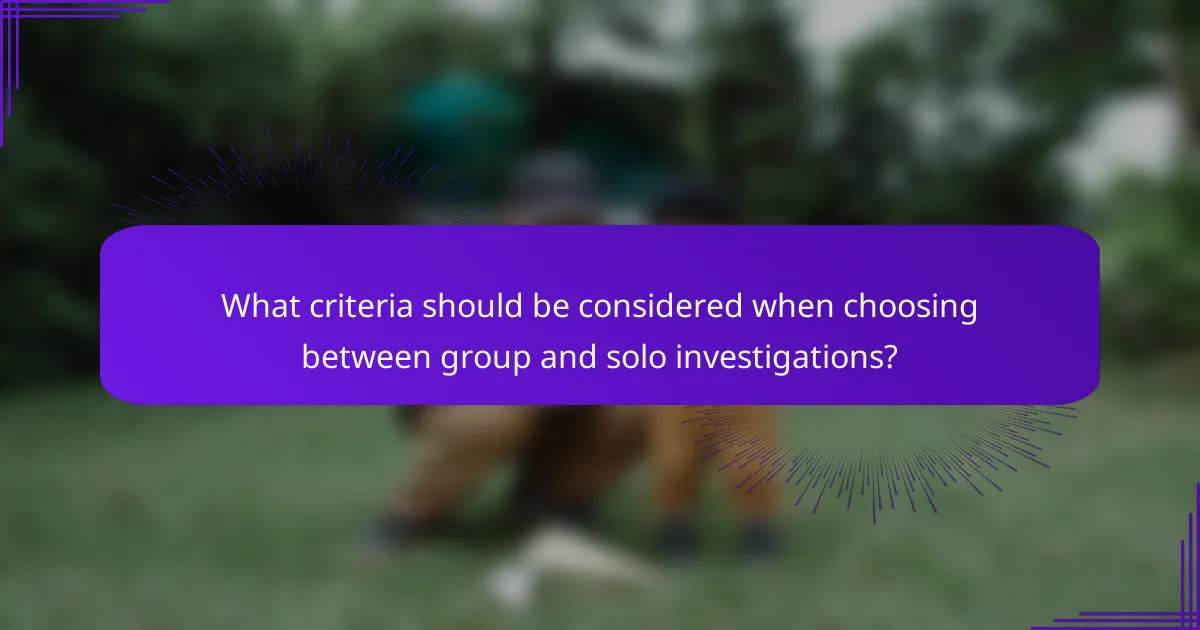
What criteria should be considered when choosing between group and solo investigations?
Choosing between group and solo paranormal investigations depends on several criteria, including the experience level of investigators and the type of paranormal activity being examined. Evaluating these factors can help determine which approach may yield better results and a more effective investigation.
Experience level of investigators
The experience level of investigators plays a crucial role in deciding between group and solo investigations. Beginners may benefit from group settings, where they can learn from more seasoned investigators and share knowledge. In contrast, experienced investigators might prefer solo investigations for greater autonomy and the ability to follow their intuition without distractions.
When forming a group, consider the collective experience. A mix of novice and expert investigators can create a balanced dynamic, allowing for mentorship opportunities. However, if the group lacks experience, it may lead to confusion or misinterpretation of findings.
Type of paranormal activity being investigated
The nature of the paranormal activity also influences the choice between group and solo investigations. For high-energy or potentially dangerous environments, such as locations with a history of aggressive spirits, a group may provide safety and support. Conversely, for quieter, more subtle phenomena, solo investigations can allow for deeper focus and personal connection to the experience.
Consider the specific characteristics of the location and the reported activity. For instance, if the activity is known to be fleeting or requires sensitive observation, a solo investigator may capture evidence more effectively. On the other hand, if the investigation involves multiple locations or requires diverse equipment, a group can facilitate a more comprehensive approach.
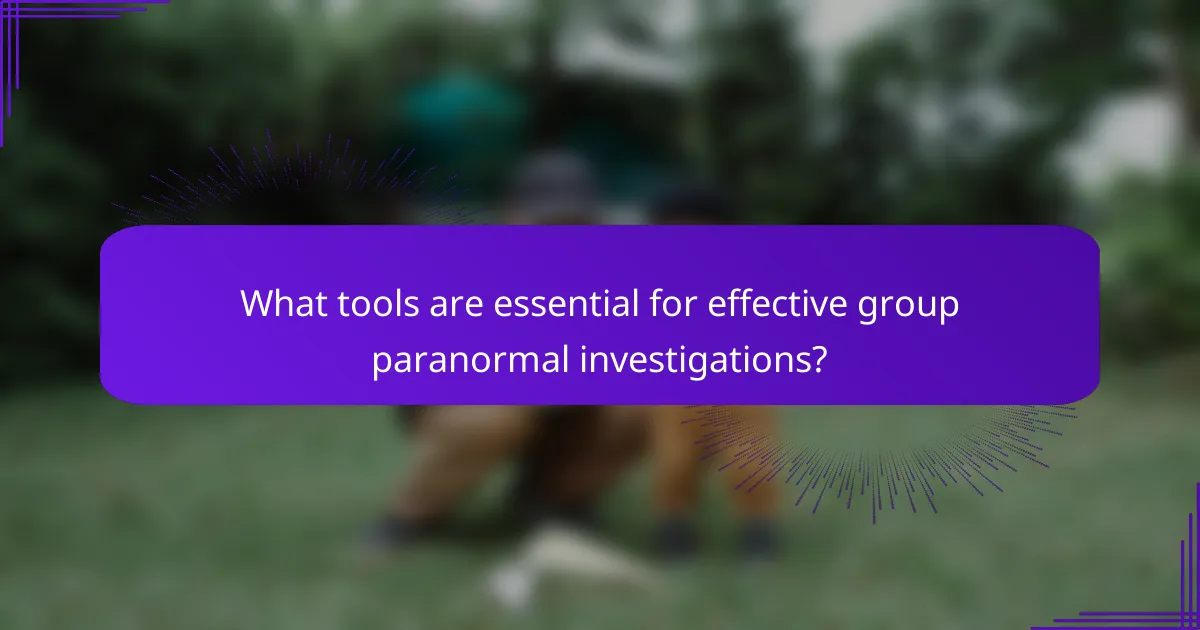
What tools are essential for effective group paranormal investigations?
Effective group paranormal investigations rely on several essential tools that enhance evidence collection and analysis. Key instruments include digital voice recorders and EMF meters, which help capture audio evidence and detect electromagnetic anomalies, respectively.
Digital voice recorders for evidence capture
Digital voice recorders are crucial for capturing audio evidence during paranormal investigations. They allow investigators to document any unexplained sounds or voices that may occur during the session. When choosing a recorder, consider models with good battery life and high storage capacity to ensure you can record for extended periods.
To maximize effectiveness, place the recorder in locations where activity is anticipated and avoid handling it during sessions to minimize noise interference. Review recordings in a quiet environment to identify potential evidence, and always keep a backup device in case of technical failures.
EMF meters for detecting anomalies
EMF meters are used to detect electromagnetic fields that may indicate paranormal activity. These devices measure fluctuations in electromagnetic radiation, which some believe correlate with ghostly presences. When selecting an EMF meter, look for models that can measure a range of frequencies and have a clear display for easy reading.
During investigations, take baseline readings in various locations to establish normal EMF levels. If you notice significant spikes, document the time and location, as these anomalies could be relevant to your findings. Avoid using the meter near electronic devices, as they can produce false positives.
